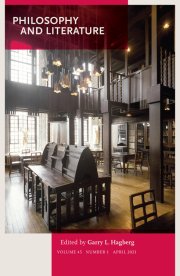Articles
THEORY OF MIND AND EXPERIMENTAL AUTOBIOGRAPHY: ALAIN ROBBE-GRILLET AND ASSIA DJEBAR
Philosophy and Literature, Volume 45, Number 1, April 2021
How do we theorize other minds? This paper argues that reading experimental autobiographies can help us practice taking the perspectives of others when our Theory of Mind capacities become at best, stale, and at worst, dehumanizing. It shows an unexpected overlap between two experimental texts: one that eschews the traditional means of communicating psychological character development in order to explore the world outside the human (Alain Robbe-Grillet’s Le miroir qui revient), and another that deliberately invests in the representation of marginalized persons as an ethical imperative (Assia Djebar’s L’Amour, la fantasia). This confluence suggests that perspective is an unalienable aspect of human subjectivity, in literature as in life.
Djibril Diop Mambéty, Sony Labou Tansi and the recourse to the imaginary
Contemporary French and Francophone Studies: Sites, Volume 23, Number 2, March 2019
This paper examines the relationship between the imaginary and political engagement in two experimental Francophone African works: Djibril Diop Mambéty’s Touki Bouki and Sony Labou Tansi’s La vie et demie. Rather than explicating the political motives for writing and filming imaginatively, this paper analyzes the effect that experimental postcolonial fictions have on their viewers and readers. It argues that the concept of as-if imagining offers new synthetic ground between aesthetic and political projects that are often perceived to be in tension with one another.
Charlotte Delbo à l’écoute: Auditory Imagery in Auschwitz et après
Special Issue, Women in French Studies Journal, 2016.
Delbo is known for the mantra that defines her work: il faut donner à voir. Accordingly, scholarship has focused on the visual imagery in the three volumes that were eventually published as Auschwitz et après. However, Delbo often demonstrates the limits to visually figurative language within the work itself. Her repeated expressions, “Essayez de regarder. Essayez pour voir,” become confrontations, rather than exhortations to the reader, who can never fully imagine the experience. This article examines the understudied role of auditory imagery in Delbo’s Auschwitz et après and discusses the limits of visually figurative language in her work. I analyze two essential elements of Delbo’s auditory imagery: the mimetic perception demanded by the guttural cries in her prose as well as the delayed auditory sensory content produced in her poetic sections. The article concludes with a discussion of Jean-Luc Nancy’s concept of the self as a resonance chamber, which sheds light on the existential role of the auditory in Delbo’s testimonial strategy. Bearing witness to extreme suffering in Delbo’s work demands a careful mental listening to remedy insufficient mental looking.
Unselfing as Disruption: The Self and Other in Pain in Valéry and Delbo
Modern Language Notes, Volume 131, Number 4, 2016.
While Paul Valéry and the “mystiques sans Dieu” attempt to renew an authentic sense of spirituality in seeking self-disruption, Auschwitz survivor Charlotte Delbo tries to put words to the “unimaginable” effect the Nazi death camps on the self. Both experiences should be understood as examples of disruptive unselfing. Studying self-inflicted accounts alongside imposed ones not only underlines unexpected convergences in the literary strategies used to communicate unusual self-experience, but also offers a new perspectives on empathy itself. The conflict between these writers’ interpretations of unselfing suggests that there is more to altruism than reduced self-interest and exposes radical empathy as a highly undesirable state.
The Mutative Self and the Language of Insight in Henri Michaux’s Mescaline Experiments
In Altered Self and Altered Self-Experience, eds. Alexander Gerner and Jorge Gonçalves, Norderstedt: Books on Demand, 2014.
This paper examines the work of Belgian-born poet Henri Michaux, who uses the concept of the mutative self to communicate his mescaline experiments of the 1950s and 1960s and reify his status as the ultimate witness figure. Lacking an operative metaphysical vocabulary for expressing the encounter with the beyond, Michaux develops a secular language for talking about the unselfing that occurs during mind-altering experiences. This self-experimentation allows him to proclaim that synchronic disunity is a natural (albeit highly uncomfortable) state. The experience of mutative unselfing alters Michaux’s perception of time and space, leading him to discover unchartered expanses of the self.




